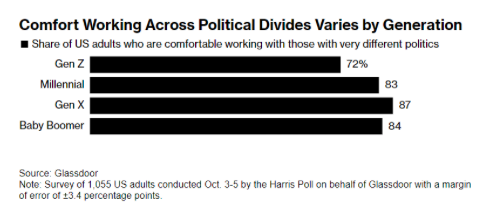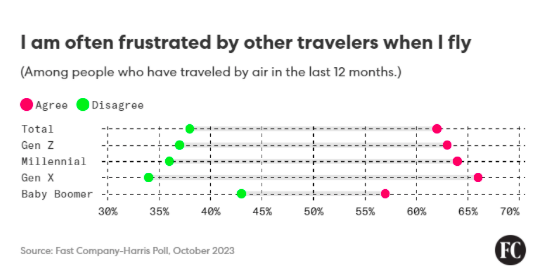Brief • 4 min Read
America This Week: Bottling Up Stress, Water Coolers Get Political, Inflation Hits Holiday Spending, And Why Planes Would Be Better Without Passengers
The latest trends in society and culture from The Harris Poll
While abortion rights fueled Democratic victories in Ohio, Virginia, and Kentucky in yesterday’s elections, the economy is a growing worry for incumbents according to our America This Week poll, fielded November 3rd to 5th, among 2,070 Americans: (87%) remain worried about the economy and inflation, while (75%) are concerned about affording their living expenses. And (82%) say they are concerned about a recession. In our October 20th Harvard-Harris Poll, Trump continues to lead Biden (46% to 41%) even as Biden’s approval rating is up slightly to (44%), as (58%) of voters approve of the job he is doing on Israel. We’ll see if that bump lasts.
This week, four new Harris Polls of note: In our latest Stress in America report with the American Psychological Association (APA), Americans aren’t sharing their stress problems. With Glassdoor, we find water cooler talk is more political than ever. Then, with NerdWallet, what does the holiday shopping season portend when many consumers are still paying off last year’s bills? And finally, with Fast Company, air travelers give a thumbs up to airline brands but a thumbs down to their fellow passengers.
Stress In America – A Collective Trauma Looms: American Psychological Association-Harris Poll
The national public health emergency from COVID-19 officially ended in May, yet our new Stress in America Report with the American Psychological Association (APA) shows sustaining mental health impacts.
- While eight in ten (81%) adults reported their mental health as good or better, nearly four in ten (37%) said they have a diagnosed mental health condition – a (5%-pt) increase from pre-pandemic levels (32% in 2019) – such as an anxiety disorder (24%) or depression (23%).
- The data also shows a tendency among respondents to downplay stress: Around two-thirds of adults (67%) reported feeling like their problems are not “bad enough” to be stressed about because they know others have it worse.
- More than six in ten (62%) said they don’t talk about their stress overall because they don’t want to burden others. A similar number (61%) said that people around them expect them to get over their stress.
- Some adults (36%) said they don’t know where to start when it comes to managing their stress, and (33%) said they have too much stress in their day-to-day lives to think about the future.
Takeaway: “The COVID-19 pandemic created a collective experience among Americans. While the early-pandemic lockdowns may seem like the distant past, the aftermath remains,” said Arthur C. Evans Jr., Ph.D., APA’s chief executive officer. “Further, widespread trauma has not been limited to the pandemic. Global conflict, racism and racial injustice, inflation, and climate-related disasters are all weighing on the collective consciousness of Americans”.
The Office Gets Political: Glassdoor-Harris Poll
Workplaces have long been considered one of the last places people form relationships across political lines. That’s changing, according to a new Harris Poll survey with Glassdoor in Bloomberg and Fast Company.
- Politics at the watercooler: 3 in 5 (61%) U.S. workers have discussed politics with coworkers over the last year – particularly younger employees (Gen Z: 64%, Millennials: 31% v. Gen X: 59%, Boomers+: 57%).
- Gen Z workers are less open: While (82%) of workers are comfortable working with those with very different political views from their own, that share falls to (72%) among Gen Z.

- Further, nearly half (49%) of Gen Z workers would not apply for a job at a company where the CEO supports a political candidate they disagree with, compared to only about (30%) of Gen X and Baby Boomers.
- Younger workers appreciate when their companies take a stand: Younger workers are more likely to feel supported when their companies take a public stance on an issue they care about (Gen Z: 71%, Millennials: 70% v. Gen X: 59%, Boomers+: 51%).
Takeaway: “More so than either Gen X or Millennials, Gen Z has come of age at a particularly fractious moment for American society, and the tumultuous experiences of the past few years will likely cast a long shadow over their lives and careers,” says Glassdoor Chief Economist Aaron Terrazas. For younger generations, politics have become increasingly existential. From climate change to gun violence to threats to the LGBTQ community to the preservation of democracy itself, the stakes are higher than ever. For some Gen Z, that leaves little room for compromise.”
Holiday Spending Is Hit By Inflation: NerdWallet-Harris Poll
Retailers are anxiously awaiting the next three weeks. But Black Friday and holiday shopping could look different this year for consumers based on our latest research with NerdWallet in The Washington Post.
- Consumers are feeling the pinch: Some 2023 shoppers say they plan to purchase gifts for fewer people this holiday season (31%) or spend less on gifts per person (30%) compared with past years.
- Inflation is tightening holiday budgets: More than half of 2023 holiday shoppers (56%) won’t be able to buy as many gifts as they’d like this year due to inflation.
- Some 2022 holiday shoppers still have debt from last year: Around half of Americans (52%) incurred credit card debt when shopping during the previous holiday season; among them, nearly a third (31%) still need to pay off these balances.
- And three-quarters (74%) of holiday shoppers plan to use credit cards to purchase gifts, with, on average, plans to spend around $680 this holiday season.
Takeaway: “A lot of macroeconomic indicators are pointing to a big slowdown in spending,” says Jeff Galak, associate professor of marketing at Carnegie Mellon University’s Tepper School of Business. Retailers are facing pressures too, which likely means smaller markdowns for Black Friday, Galak says. “There’s still a floor, and that floor is going up” (Washington Post).
The Worst Part Of Air Travel? The Travelers: Fast Company-Harris Poll
For most airlines, maintaining a carefully crafted sense of hospitality is vital to courting repeat flyers. Still, there’s one variable that airlines can’t control: the behavior of their passengers—a grievance of many travelers, according to our new research with Fast Company.
- Overall, (91%) of those who had traveled by plane in the past year reported feeling satisfied with their experience, with (54%) noting that they were “very satisfied.”
- But fellow passengers garnered less-than-glowing feedback: Over six in ten (62%) were frustrated by other passengers, and annoyance levels were relatively consistent across age groups.

- Emissions a more significant concern among Gen Z: There was a notable generational divide in perspectives on the environmental impact of flying as (67%) of Gen Z was “concerned” about emissions, compared with only (39%) of baby boomers.
- Delta is voted the best airline: According to another Harris survey with Fast Company, Delta was named as the preferred airline of choice (26%), edging out Southwest Airlines (22%), American (20%), and United (17%).
Takeaway: Even as flight prices continue to rise (sometimes outpacing inflation), it seems like flying isn’t going anywhere: 78% of respondents said that they prefer planes over other forms of long-distance transportation like cars or trains” (Fast Company).
Subscribe for more Insights
Subscribe to our newsletter for the latest trends in business, politics, culture, and more.
Download the Data
This survey was conducted online within the U.S. by The Harris Poll from November 3rd to 5th among a nationally representative sample of 2,070 U.S. adults.
Download
Subscribe for more Insights
Subscribe to our newsletter for the latest trends in business, politics, culture, and more.
Download the Data
This survey was conducted online within the U.S. by The Harris Poll from November 3rd to 5th among a nationally representative sample of 2,070 U.S. adults.
DownloadRelated Content








